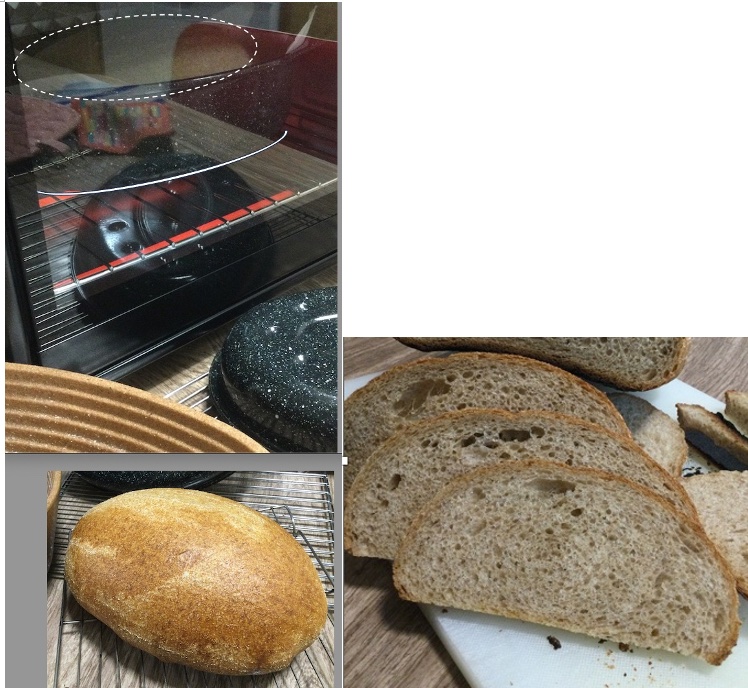June 6, 2024 - 1:36am

wm mainstay oven w/granite roaster
Here is my first bake in the Walmart Mainstay LG 6 slice toaster oven. (burnt ends at right)
The great thing here is that the small Granite Roaster with top fits into this oven!
It is an easy way to get a steam bake. You can see that this freeform loaf of 720g dough is rising to the top of the roaster. It is a 50-50 BF-WW loaf. I used Breadtopia's oblong banneton and the loaf fits nicely into the small granite roaster.

I did make some mistakes. Though the baking rack was on the 2nd level, I burned the bottom - I should have lowered the temp after the lid came off (steaming was 15 min). It was at 400-425F. Next time I will drop it to 350F.


Make sure you have it on convection if thats an option, I use a wolf toaster oven and without using convection the bottom burns.
Hi, Thanks for the tip!
However, I don't think there is convection with this oven.
It's been a while and I haven't tried it in our current oven..... But every loaf I baked in a granite roaster ended up with a burned bottom. Changing oven rack height, toaster vs regular oven, sheet pan on the shelf below.... That last one helped the most, but overall I couldn't crack the code on keeping the bottom of the loaf from being darker than the rest and gave up on the idea.
Toaster oven baking though, that worked better than expected for me! We lived in AZ at the time, and I did that on the back patio during a kitchen remodel. Details here if interested. I definitely recommend using butter or some sort of cooking spray on the bowl, or risk some fairly significant difficulty getting the bowl "lid" off.
Hi,
Thank you for telling me about all the things you tried. I'll try the sheet pan idea.
I really liked your cast iron flat pan as the base for your great bake. I have that pan and had never thought to use it. I think it might be a bit heavy for the rack in this oven but certainly will be worth a try in the reg oven.
I had parchment paper with the loaf and that took care of sticking problems. I learned the hard way once when my entire loaf stuck to an aluminum pan. :(
I have one of those ceramic chicken roasters that i use and it works very well.
The Walmart XL toaster oven is a primarily radiant oven. The interior is entirely reflective and it does not rely on heating those surfaces up like most ovens do. Radiant can be redirected using polished/shiny metal surfaces, like aluminum foil. Simple adjustments will make a big difference in fine-tuning the heat distribution without changing the basic nature of the oven. Covering the bottom of the graniteware pan with aluminum foil with shiney side out should solve the bottom burning. I would also suggest covering the crumb tray with foil to increase its reflectivity.
I also see that one side of the loaf baked less. That happens because the oven door is glass and lets much of the radiant energy pass right through. The simple fix is to hang a sheet of aluminum foil on the inside of the door, shiney side facing in. A standard 12" wide piece of foil will cover most of the door and leave an inch or so open on either end so you can peek in with a flashlight and see how the bake is progressing. Ater doing this to mine, I get even bakes all around without rotating the pan or loaf midway.
It was 98 here yesterday. This oven is lightweight and easy to move. It was great to just put the oven out on the porch to do the bake and keep the heat out of the kitchen!
I have read that it doesn't matter which side faces the IR source - what is most reflective for infrared is not always the same as for visible light. I haven't tested it but it seems plausible and agrees with my ordinary cooking experience. Have you tried the foil both ways - it would be useful to get some confirmation one way or the other.
You are in or near the "heat dome", aren't you? I hope the your home isn't quite that hot indooors! My old uncooled adobe house with 16-inch thick walls in New Mexico didn't get much over 80 deg F even on the hottest days. I was right next to an irrigation ditch, and had some shade from a big tree, all of which must have helped.
TomP
IR sits just below red in the electromagnetic spectrum; a litle longer wavelengths, but visible and IR are more alike than different. A shiney metal surface is a better reflecter of either; not hugely so, but better. A quick review of thermal radiant barriers will show they all instruct the shiney side to be placed toward the IR source. So it's a good habit.